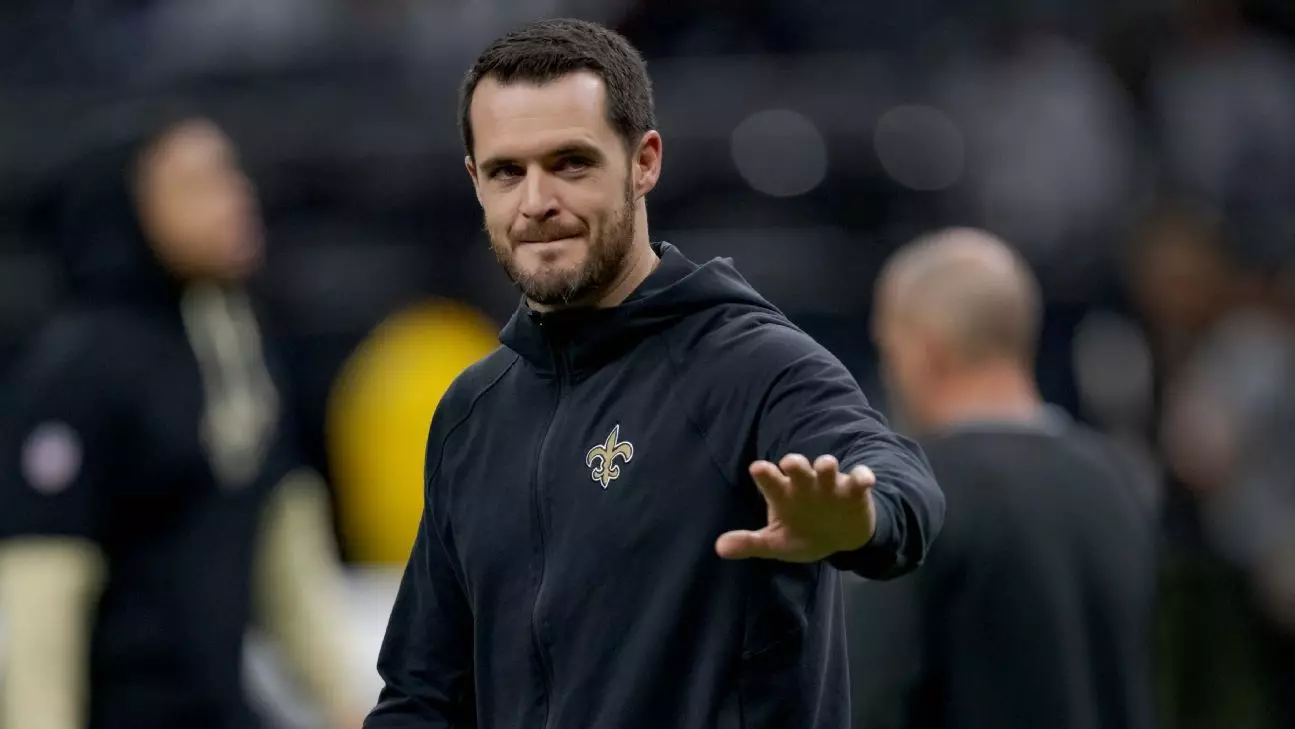The New Orleans Saints have officially ruled out quarterback Derek Carr for their upcoming clash against the Tampa Bay Buccaneers, a decision that signals the end of his 2023 season. Despite ongoing optimism from interim coach Darren Rizzi regarding Carr’s potential return to the field, reality has set in as the team navigates the fallout of his fractured non-throwing hand sustained during a crucial game against the New York Giants on December 8th.
Throughout the past few weeks, Coach Rizzi stood firmly against the narrative that Carr’s season was over, consistently emphasizing the quarterback’s commitment to rehabilitation. “I got frustrated with reports in the beginning,” Rizzi lamented. He expressed admiration for Carr’s dedication, noting that he had been actively working on his recovery instead of resigning himself to the idea that he might not play again this season. This situation reveals an interesting dynamic in sports where medical realities clash with the players’ and coaches’ aspirations. Rizzi maintained that Carr’s motivation was evident as he worked tirelessly to return, hoping to make an impact in the final games of the season, particularly against his former team, the Raiders.
What becomes clear is that optimism can sometimes blur the lines of reality in professional sports. While Rizzi’s sentiments reflect a coach’s instinct to support his player, the stubborn belief that Carr could overcome his injury without a realistic evaluation led to a delayed acknowledgment of the situation. The inability to fully function in a game scenario was a critical aspect that Rizzi, albeit reluctantly, had to come to terms with eventually.
As the week progressed, the injury concerns began to ripple through the Saints’ roster, with fellow key player Alvin Kamara listed as doubtful due to a groin injury. This uncertainty further compounded the anxiety surrounding the team’s prospects. Rizzi spoke of testing Kamara’s readiness to play, but doubts lingered. Meanwhile, Chris Olave’s status was listed as questionable after battling multiple concussions throughout the season, adding to the Saints’ growing list of concerns.
These injuries highlight a broader issue often faced by teams in the NFL: how they adapt in the face of adversity. For the Saints, this season has been plagued with inconsistency, setbacks, and the toll of injuries, leading to a potential questioning of the team’s depth and resilience. The burden of injury can be a heavy weight for any franchise, and without a strong quarterback, the dynamics of the team shift dramatically, needing other players to rise to the occasion even when they themselves might be limited.
In the lead-up to the match against the Raiders, the Saints attempted a unique approach to reintegrate Carr onto the field. They devised a simulation scenario intended to assess how well Carr could perform under game-like conditions. Despite best efforts, including pain management techniques, it became evident that Carr lacked the necessary functionality to participate, leading to a premature dismissal of his game potential. Rizzi’s frustrations became apparent as he reflected on the failed attempt, indicating that the team had conducted this “simulation” but ultimately needed to concede that they weren’t ready to take that gamble again.
This begs the question: how far should a team push a player who is compromised due to injury? The complicated relationship between a player’s willingness to return and the medical team’s judgment could lead to further complications down the line. Such scenarios highlight the ongoing evolution of injury management in high-stakes professional sports, where the balance between player safety and competitive spirit is constantly assessed.
As the Saints look towards their season finale without Carr, the implications of his absence resonate more broadly. The team’s hopes may hinge on cultivating a strong backup strategy that can provide stability in the quarterback position moving forward. Differentiating between a player’s desire to compete and their physical readiness is a complex challenge for many organizations.
In the end, while the struggle with injuries is a common narrative in sports, the Saints are entering a critical phase that may redefine their season’s trajectory. As they proceed, the decisions made in the coming weeks will likely influence not only their performance but also the foundational structure of their team for years to come, leading to inevitable discussions surrounding roster adjustments and future strategies as they heal from a tumultuous season.

